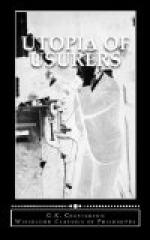Mental Breakdown in Fleet Street
One of the two or three streaks of light on our horizon can be perceived in this: that the moral breakdown of these papers has been accompanied by a mental breakdown also. The contemporary official paper, like the “Daily News” or the “Daily Chronicle” (I mean in so far as it deals with politics), simply cannot argue; and simply does not pretend to argue. It considers the solution which it imagines that wealthy people want, and it signifies the same in the usual manner; which is not by holding up its hand, but by falling on its face. But there is no more curious quality in its degradation than a sort of carelessness, at once of hurry and fatigue, with which it flings down its argument—or rather its refusal to argue. It does not even write sophistry: it writes anything. It does not so much poison the reader’s mind as simply assume that the reader hasn’t got one. For instance, one of these papers printed an article on Sir Stuart Samuel, who, having broken the great Liberal statute against corruption, will actually, perhaps, be asked to pay his own fine—in spite of the fact that he can well afford to do so. The article says, if I remember aright, that the decision will cause general surprise and some indignation. That any modern Government making a very rich capitalist obey the law will cause general surprise, may be true. Whether it will cause general indignation rather depends on whether our social intercourse is entirely confined to Park Lane, or any such pigsties built of gold. But the journalist proceeds to say, his neck rising higher and higher out of his collar, and his hair rising higher and higher on his head, in short, his resemblance to the Dickens’ original increasing every instant, that he does not mean that




